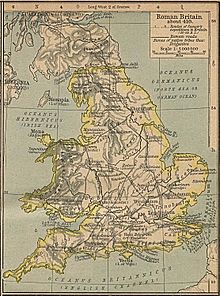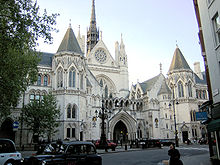- England and Wales
-

England and Wales (Welsh: Cymru a Lloegr) is a jurisdiction within the United Kingdom. It consists of England and Wales, two of the four countries of the United Kingdom. Unlike Scotland and Northern Ireland, England and Wales follow the legal system known as English law, and the two form the constitutional successor to the former Kingdom of England.
The devolved National Assembly for Wales (Welsh: Cynulliad Cenedlaethol Cymru) was created in 1999 by the Parliament of the United Kingdom under the Government of Wales Act 1998 and provides a degree of self-government in Wales, including limited powers to amend Acts of Parliament. These powers were expanded by the Government of Wales Act 2006, and the Welsh Government can now propose and pass its own laws.
Contents
History
 The Roman province of Britannia in 410
The Roman province of Britannia in 410
The Roman occupation of Britain was the first period in which the area of present-day England and Wales was administered as a single unit (with the exception of the land to the north of Hadrian's Wall). At the time, all the native inhabitants of Roman Britain spoke Brythonic languages, and were all regarded as Britons, divided into numerous tribes. After the conquest, the Romans administered this region as a single unit, the province of Britannia.
Welsh law developed from this base. It was first codified by Hywel Dda (Hywel the Good; reigned 942 – 950) when he was king of most of Wales. The Statute of Rhuddlan in 1284 replaced Welsh criminal law with English law. Welsh law continued to be used for civil cases until the annexation of Wales to England in the 16th century.
Law
England and Wales are treated as a single unit, for most purposes, because the two form the constitutional successor to the former Kingdom of England. The continuance of Scots law was guaranteed under the 1706 Treaty of Union that led to the Acts of Union 1707, and as a consequence English law (and after 1801, Irish law) also continued to be separate. Exceptions include the Welsh Language Acts 1967 and 1993 and also the Government of Wales Act 1998, plus Measures of the National Assembly for Wales passed since the Government of Wales Act 2006, which apply in Wales but not in England.
 The Royal Courts of Justice of England and Wales.
The Royal Courts of Justice of England and Wales.
Originally, Wales had its own system of law; however, following the Norman invasion of Wales in the 11th century, English law came to be practised in the parts of Wales conquered by the Normans (the Welsh Marches). In 1283 the English, led by Prince Edward, with the biggest army brought together in England since the 11th century, conquered the remainder of Wales, then organised as the Principality of Wales, which was united with the English crown by the Statute of Rhuddlan in 1284. Later, the Laws in Wales Acts 1535–1542 consolidated the administration of all the Welsh territories and incorporated them fully into the legal system of the Kingdom of England.[1]
Prior to 1746 it was not clear whether a reference to "England" in legislation included Wales. And so in 1746 Parliament passed the Wales and Berwick Act, which specified that in all prior and future laws, references to "England" would by default include Wales (and Berwick). The Wales and Berwick Act was repealed in 1967 although the statutory definition of "England" it created is preserved for acts passed prior to its repeal. Since the Act's repeal what was referred to as "England" is now "England and Wales", while references to "England" and "Wales" refer to those political divisions.
Company registration
Main article: Companies HouseFor a company to be incorporated in the United Kingdom, its application for registration with the Companies House must state "whether the company's registered office is to be situated in England and Wales (or in Wales), in Scotland or in Northern Ireland",[2] which will determine the law applicable to that business entity. A registered office may be specified as "in Wales" if the company wishes to use a name ending cyfyngedig or cyf, rather than Limited or Ltd.
Other bodies
Outside of the legal system the position is mixed. Some organisations combine as "England and Wales", others are separate.
In sports, cricket has a combined international team administered by the England and Wales Cricket Board, while football, rugby union, the Commonwealth Games and other sports have separate national representative teams for either country.
Some religious denominations organise on the basis of England and Wales, most notably the Roman Catholic Church, but also small denominations, e.g. the Evangelical Presbyterian Church. Prior to the disestablishment of the Church in Wales in 1920, the Anglican church in Britain operated under the jurisdiction of the Church of England throughout Wales and England.
The Electoral Commission maintains a register of political parties, organised according to where the party operates. As of August 2008 the Commission listed nine parties registered as operating in England & Wales (as opposed to 170 operating in England only, and ten operating in Wales only), the largest of which is the Green Party of England and Wales.
Some professional bodies represent England and Wales, for example the Institute of Chartered Accountants in England & Wales, the General Council of the Bar, the Law Society, the National Farmers Union and the Police Federation of England and Wales. Other examples include the Charity Commission, the Environment Agency, the General Register Office for England and Wales, Her Majesty's Inspectorate of Constabulary, HM Land Registry, Her Majesty's Prison Service, Mountain Rescue England and Wales, the Worshipful Company of Chartered Accountants, Livery Company, and the Youth Hostels Association.
The order of precedence in England and Wales is distinct from those of Northern Ireland, Scotland, and other Commonwealth realms.
The national parks of England and Wales have a distinctive legislative framework and history.
Geography
See also: Geography of England and Geography of WalesEngland and Wales have a combined population of 53,390,300, or 89% of the total population of the United Kingdom.[3] England and Wales comprises 58,368 square miles (151,170 km2), or 61.75% of the total area of the United Kingdom.
Major cities in England include London, Birmingham, Manchester, Leeds, Sheffield, Newcastle, Nottingham, Liverpool and Bristol. Major cities in Wales include Cardiff, Newport and Swansea. Cardiff was proclaimed as the Welsh capital in 1955;[4] London has been the capital of England since Norman times (replacing Winchester), and of the UK following its creation.
See also
- Courts of England and Wales
- Judiciary of England and Wales
- English and Welsh
- Cultural relationship between the Welsh and the English
References
- ^ Cannon, John (2009). A Dictionary of British History. Oxford University Press. p. 661. ISBN 0199550379. http://books.google.com/books?id=TYnfhTq2M7EC&printsec=frontcover&cad=0#v=onepage&q&f=false. Retrieved 15 October 2010.
- ^ Subsection 9(2) of the Companies Act 2006
- ^ Official mid-2005 population estimate; England=50,431,700 Wales=2,958,600 UK=60,209,500
- ^ Cardiff as Capital of Wales: Formal Recognition by Government. The Times. 21 December 1955.
Categories:
Wikimedia Foundation. 2010.
